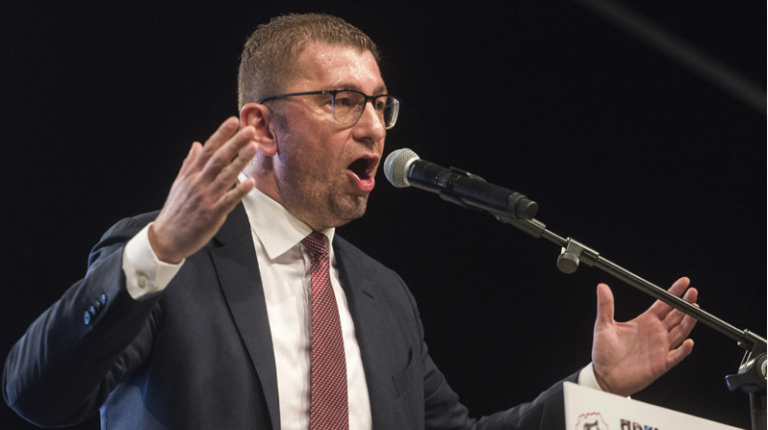The line drawn by the new President of North Macedonia, Gordana Siljanoska, seems to be followed by the VMRO chairman and newly elected Prime Minister of the country, Hristijan Mickoski, on the Prespa Agreement, by launching a new challenge.
In his remarks, he claimed that it is a constitutional right of the country to call itself what it wants and, when asked by a journalist who asked him to comment on Siljanovská’s statements at her swearing-in ceremony, he said that she was dignified and that she “expected congratulations from our southern neighbour”.
Among other things, he called on Greece to stop its attacks – as he described them – on his country and if it has a problem to go to the Hague tribunal.
“We expect to have good and excellent neighbourly relations. I appreciate that the VMRO and the government there under the leadership of the New Democracy have their own position on the Prespa Agreement. None of us likes this agreement,” Mickoski commented, describing it as his “basic human right” to call his country whatever he wants in public discourse and in the media.
“We have no violation of the Prespa Agreement and I use this opportunity to tell our friends from Greece to stop making threats. Let’s look to the future, these are documents that are part of the law. If they think we have violated the agreement, then there is the International Court of Justice, so we can talk there. I would not like that to happen, I call for friendly relations, helping each other. And if someone expects the VMRO to repeat the mistakes of the past, you can be sure that we will not do that,” Mitskoski then added.
“We want economic cooperation and I take this opportunity to invite Greek companies to invest in my country, we want to welcome them and our companies to invest in Greece, this is how partners should cooperate. We want good neighbourly relations and I expect to meet the Greek Prime Minister soon and discuss cooperation in tourism, economy, education and so on,” Mitskoski concluded.
Gerapetritis: “Concessions will not be tolerated”
Meanwhile, Foreign Minister George Gerapetritis sent a new message to North Macedonia after his meeting with Czech Foreign Minister Jan Lipavský.
Responding to questions from journalists, George Gerapetritis said that “there is no room for any concessions. Greece will strictly monitor the situation in North Macedonia. We are really asking the government and the president of North Macedonia to faithfully implement the Prespa Agreement. We are very willing to discuss further. But, as I said, concessions on fundamentals cannot be tolerated.”
He added: “All member states will ultimately be judged on the fundamentals. They must respect the benchmark set for their country and, of course, the acquis communautaire. As far as North Macedonia is concerned, we know that one of the preconditions for the development of the pre-accession process is that the government of North Macedonia fully respects the Prespa Agreement, which precisely indicates the constitutional name of the country.
In any case, it is the will of the Greek government to continue to implement the Agreement. However, we must be fully aware of the fact that there can be no concessions when it comes to the actual implementation of international agreements, which by definition, by the Constitution, take precedence over common laws.”
Also, as regards the enlargement of the EU towards the Western Balkans, he explained that “we share the same views as the Czech Republic. We are in principle in favour of enlargement. We believe that the natural path for the Western Balkan states is the European family. I believe that this will also be to the benefit of the European Union. It will reinvigorate the European project and it is always good to give positive signals to the peoples of Europe about their future.”
It is noted that diplomatic sources, following the provocative statements of the new Prime Minister of North Macedonia, referred to the above statements of Mr. Gerapetritis, which echo the positions of the Greek side on the issue.
Siljanovská swore in as president and called her country “Macedonia”
It will be recalled that on Sunday 12/5 at noon, the President of North Macedonia, Gordana Siljanovská, was sworn in at a special session of the Parliament. During the swearing-in, Siljanovská referred to the country as “Macedonia”, despite the fact that in the text of the oath, which was recited by the outgoing Parliament’s President Jovan Mitreski, inviting Siljanovská to repeat it, the country was referred to as “North Macedonia”.
Greece’s ambassador to North Macedonia, Sofia Filippidou, who had been invited to the session of the Parliament for the swearing-in of Gordana Siljanovská, walked out in protest against the latter’s calling the country “Macedonia” during her swearing-in, in violation of the Prespa Agreement.
Mitsotakis from Chios: Political stability is the stake of the European elections
Gordana Siljanovská, 71, was elected president of North Macedonia in the second round of the presidential election held on Wednesday 8/5 as the candidate of the VMRO-DPMNE, defeating the former president of the country, Stevo Pedarovski, with 65% of the vote.
In parallel with the second round of the presidential elections, the country held parliamentary elections, in which the right-wing opposition party VMRO-DPMNE won a big victory, taking almost 60 of the 120 seats in the Parliament.
This party started negotiations with the coalition of opposition Albanian parties “Worthy” to form a government.
Ask me anything
Explore related questions





